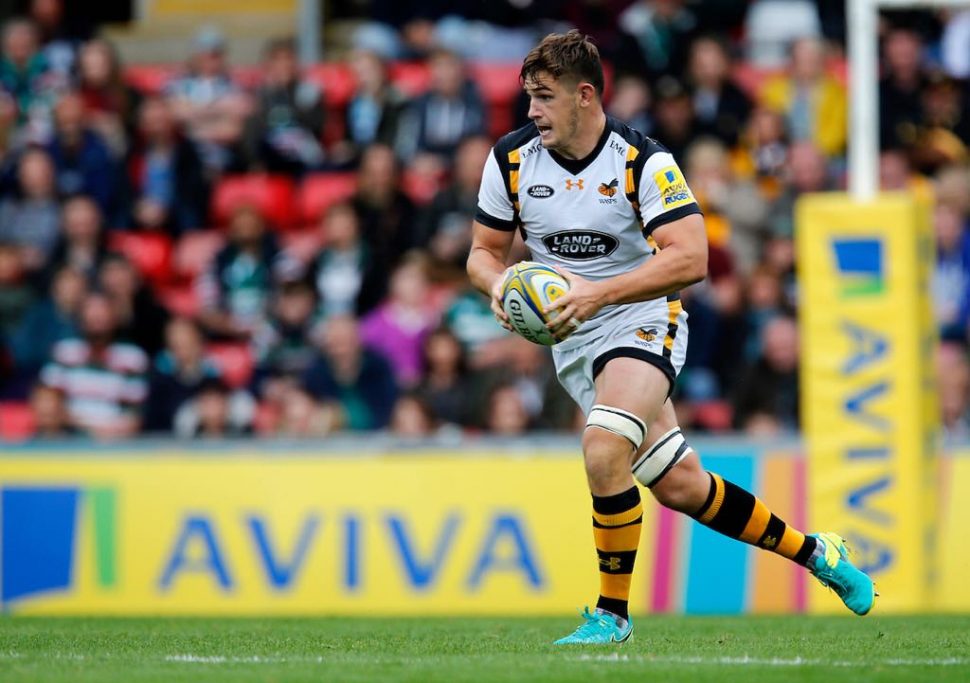Sam Jones – Dealing with Injuries

Return2Play spoke with Wasps Rugby star Sam Jones. Having suffered an injury last season and still awaiting his return to the pitch, we spoke to Sam about his experience with injury throughout his career.
Sam, firstly congratulations to Wasps Rugby for last season and getting to the Premiership final, it must seem a long time coming for you. How did it feel watching the game?
It was a bit bittersweet! It was a fantastic occasion for the entire club – both players and staff – although it was pretty gutting not to be out there or to have at least played a slightly bigger part in helping the club reach the final. As a spectator, the game was completely nerve wracking, it could have gone either way and although the result wasn’t what we wanted the boys gave it everything.
What do you think Wasps needs to do in order to get their hands on the trophy this season?
I think we just need to keep doing what we’ve been doing all year. As I said, it was so close that on another day we would have sneaked it. I think the experience of having been in a final will help us a lot over the next couple of seasons – as I think it helped Exeter having been beaten in the same match the year before. To become a successful team you need to learn from a few failures along the way.
“You have to look on the positive side otherwise it becomes very difficult”
Talking of trophies and achievements, what has been the highlight of your school sporting career?
In my final year at school, the 1st XV had an unbeaten season and made Rugby World’s School team of the month. Along the way we also beat out local rivals RGS High Wycombe 29-3 which was a huge achievement for us.
When you were at school who did you look up to the most, who inspired you?
I looked up to some of the older boys who went on to play professionally for Wasps having been picked from their schoolboy performances. Guys like Bob Baker and Jack Wallace showed if you worked hard and played well it wouldn’t go unnoticed by the top clubs.
Last season must have been tough for you, having just been called up to the England squad and what could have been your first premiership final, mental strength must play a huge part during an injury or concussion, do you have any tips for people coping with this?
You have to look on the positive side otherwise it becomes very difficult. Personally, I used the injury as a way to improve my strength and conditioning in the gym and get my body in better shape to perform for when I come back. It’s also a great opportunity to give the rest of your body a break from the regular battering it takes. Its also important to find something else to preoccupy you whether that be work in the community, some studying or work experience to keep you mentally stimulated and prepare you for life after rugby.
What do you find is the hardest part about being injured?
Not feeling a part of the team. Everything revolves around teamwork and when you are unable to contribute it becomes difficult. It’s important that you try and stay involved whether that’s socially or by helping out with coaching tips/analysis etc.
Has being injured given you more time to explore other interests, potentially things that you would like to do when you retire from rugby?
Yes, I’ve always been into restaurants and food so I would like to go into that industry after rugby. I’ve managed to do some writing for a couple of websites on the dining trends and certain new restaurant reviews and managed to make some valuable contacts for life after rugby.
Can you talk us through a typical daily routine since you have been injured?
I’ve spent most of my time in the gym! We start pretty early at about 8am with upper body weights followed by physio treatment and pretty intense rehab which lasts until lunch. After lunch we do a fitness/conditioning session followed by extra top ups such as static skills, prehab, core work. Once you get back to the stage where you can run you are slowly integrated back into full training.
From transitioning into professional rugby what differences have you noticed in how injuries and concussions are managed?
Everything is scrutinised a lot more. You have regular interactions with physios and doctors and they are constantly assessing your progress. They usually put in as much time as needed to get you back to where you need to be to perform at your best, whereas at school if you managed to see a physio/doctor it would be very limited. They also give you ongoing programmes to prevent injury rather than just reacting to acute ones.
Between school, club and academies do you feel that you played too much sport and if so, did this contribute to any injuries?
I was lucky growing up that I didn’t sustain too many injuries despite playing a lot of rugby. I only started picking up a few knocks when I moved to men’s rugby at the age of 17 as the physicality of the game became much more intense.
“Concussions are inevitable in a contact sport like rugby, but it’s how you manage them that’s important.”
If you suffered an injury during school years, what was the process of communicating this?
You would normally have to self diagnose your injury and inform the coaches of your various teams that you wouldn’t be able to play. It wasn’t ideal really as there just wasn’t the qualified medical staff to help. I was lucky that I was involved in the Wasps Academy as I could visit their physios and be treated much like a professional would.
Concussion is a huge talking point at the moment, and many are being put off playing sports like rugby, having suffered head injuries yourself, what is your opinion on the matter going forward?
Concussions are inevitable in a contact sport like rugby, but it’s how you manage them that’s important. The profile of head injuries has risen hugely which means that clubs and coaches are forced to treat them seriously which is great for player welfare. There just needs to be more information out there as it’s quite a grey area and I think we are getting there.
Who has been your most influential coach?
Rob Smith was my Academy Manager growing up and he guided my career in the early years which was an extremely important time.
Finally, if you could tell your younger self anything what would it be?
Try and relax a bit more! You play your best rugby when you’re enjoying it so just aim to do just that.
Thank you for your time and we all wish you and Wasps Rugby well for this season.
Sam’s thoughts on Return2Play
Having heard what Return2Play offer, and going on your own experiences, do you feel that R2P is something that will help grassroots sports become safer and managed better?
Certainly. It is allowing schoolboy and grassroots rugby access to a platform that is similar to what professional outfits use. Player welfare and safety is the most important thing in sport and R2P are making sure that everyone involved is up to speed with any one injury.
Did you ever struggle getting a doctor’s appointment at school, and did this ever prolong the time that you were unable to play for?
I’m not sure I ever went to a doctor – it seemed like too much hassle! This is certainly not advisable and with a platform like R2P it makes it much easier to find a certified professional who can give you permission to return to sport safely and quickly.
